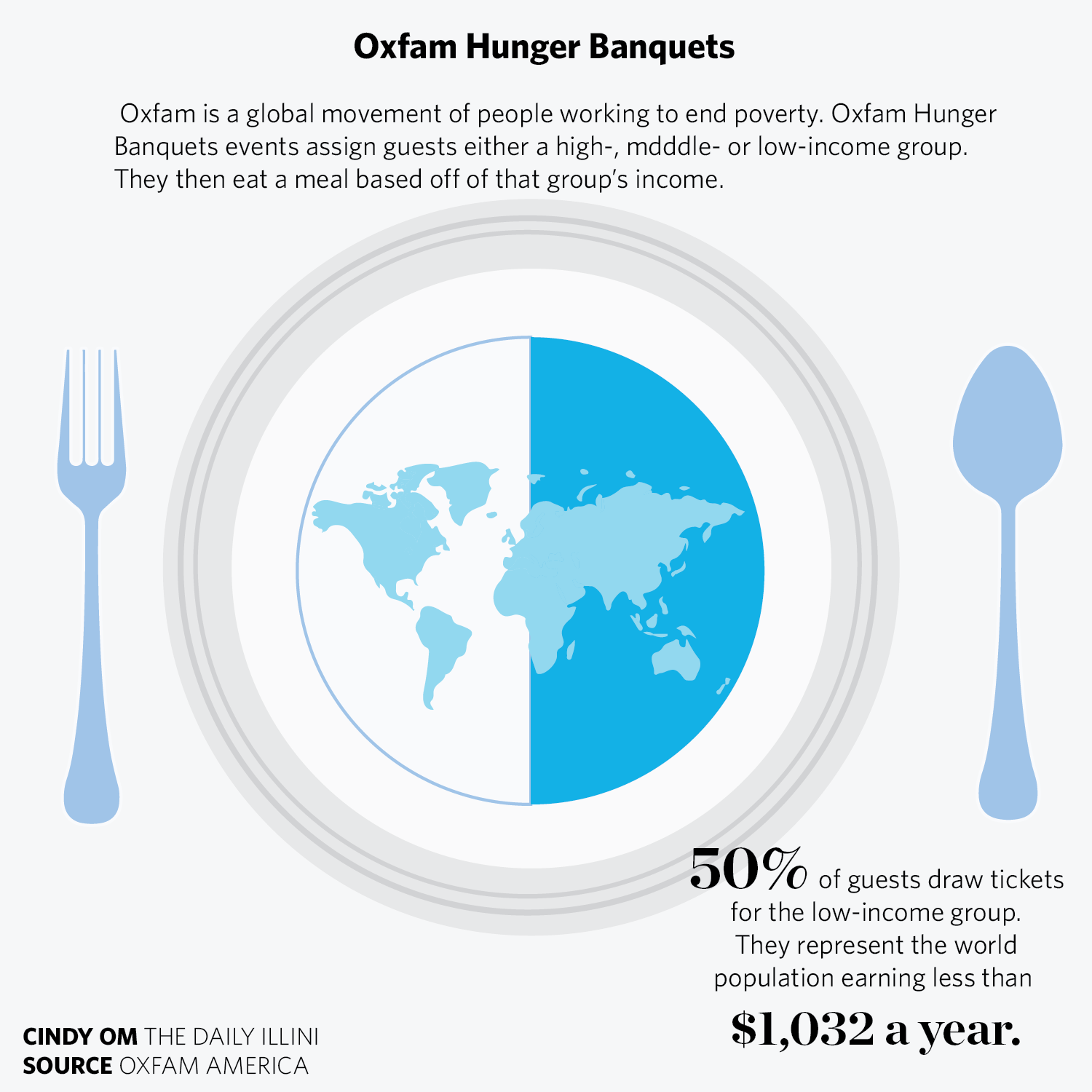Unify’s hunger banquet to bring food security awareness
Apr 9, 2017
Half of the guests at the Unify: An Illinois Task-Force Hunger Banquet will receive only half a cup of rice for their entire meal. These guests will also receive a cup of water. No eating utensils will be provided.
This dining plan simulate s the experience of low-income families across the country.
Unify: An Illinois Task-Force will hold its first hunger banquet at the Funk ACES Library 7 p.m. on Monday. The dishes will be served to guests at the event.
Tom Poole, president of Unify and junior in ACES, described the organization as a new academic program created to facilitate student collaboration in the areas of food security, sustainable systems and human livelihood.
Get The Daily Illini in your inbox!
The organization is composed of an executive board and a group of delegates who represent other student-led organizations with similar interests, such as Illini Fighting Hunger and other ACES and sustainability clubs.
“We’re not officially the first organization to bring this on campus; we’re just trying to establish ourselves,” Poole said. “We believe this will be a good opportunity to gain potential interests of our students.”
Upon arrival, attendees draw a ticket determining which socioeconomic group they will be a part of for the night. Their class determines what they will eat as well as their entire dining experience.
The middle-income group represents about 30 percent of the guests. They will be served half a cup of rice and a spoon full of beans. The middle-income group will also receive either a fork or a spoon, a napkin and a cup of water.
About 20 percent of the guests represent the high-income group. These guests are typically served a meal with pasta, salad, bread and juice; however, the meal can consist of other foods other than rice and beans depending on who is hosting the event.

The goal of the banquet is not solely focused on food disparity. Unify hopes to motivate banquet attendees to participate in future events and projects.
“During this time we will also be discussing what Unify is doing, besides bringing the importance of food security to our University of Illinois students,” Poole said. “We’ll also be talking about upcoming projects with Unify to promote collaboration, such as starting a Campus Kitchens chapter.”
The Campus Kitchens Project is a nonprofit based in Washington, D.C. that partners with colleges and universities. They work to prevent food waste by recovering unused food from cafeterias, restaurants and grocery retailers, and then delivering it to those who have food insecurity.
Food insecurity is one of many crises that Oxfam seeks to alleviate. This international charitable organization’s main concern is global poverty.
According to The World Bank, the poverty headcount ratio — income at $1.90 a day — was 13.5 percent in 2011. It decreased to 10.68 percent in 2013.
The 2.82 percent poverty headcount ratio decrease in two years indicates that efforts of groups like Oxfam’s are making progress.
Nessa Stoltzfus, youth engagement manager at Oxfam America, said the University has a decade-long history of hosting Oxfam-sponsored Hunger Banquets. On record, there have been eight banquets. The dinners were hosted by academic departments as well as other student-led organizations like Habitat for Humanity and UNICEF UIUC.
“There are about 500 hunger banquets that take place every year and about 60 percent of those hunger banquets are held on university and college campuses,” Stoltzfus said.
Oxfam offers a downloadable toolkit on their website with instructions on how to host a banquet. Since the resource is free, it is difficult to know just how many banquets are held each year across the U.S., especially if they aren’t reported to Oxfam. If an organization contacts Oxfam with a desire to hold a banquet, Oxfam offers staff support and other planning information to assist them with their event.
“We find that a lot of organizers host a hunger banquet as a fundraiser for a specific humanitarian response, whether it’s for Syrian refugees, (or) the current famine in South Sudan that’s going on right now,” Stoltzfus said. “We’re able to provide organizers with talking points and mail or offer downloadable resources to organize their event.”
Poole hopes that Unify’s first hunger banquet will interest other students in food security and sustainability, and ultimately motivate them to join the clubs they work with.
“Unify is an organization that is trying to get everyone at the same dinner table, figuratively and literally,” Poole said. “We’re trying to establish connections with other student organizations and to establish connections with each other.”





